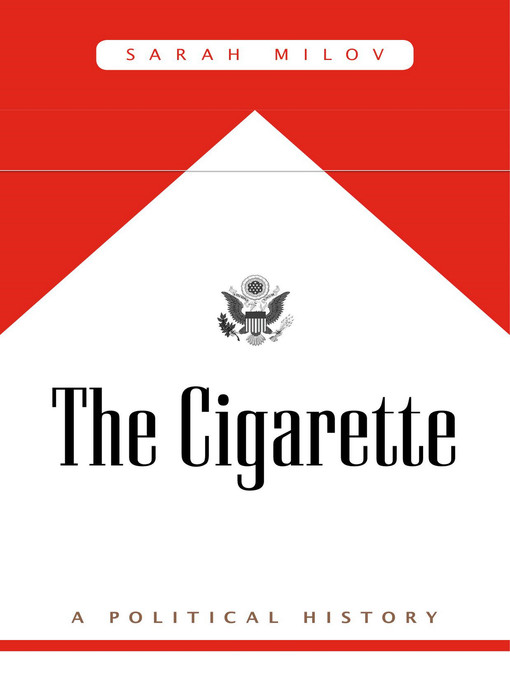Los Angeles Times Book Prize Finalist
Winner of the Willie Lee Rose Prize
Winner of the PROSE Award in United States History
Hagley Prize in Business History Finalist
A Smithsonian Best History Book of the Year
"Vaping gets all the attention now, but Milov's thorough study reminds us that smoking has always intersected with the government, for better or worse."
—New York Times Book Review
From Jamestown to the Marlboro Man, tobacco has powered America's economy and shaped some of its most enduring myths. The story of tobacco's rise and fall may seem simple enough—a tale of science triumphing over corporate greed—but the truth is more complicated.
After the Great Depression, government officials and tobacco farmers worked hand in hand to ensure that regulation was used to promote tobacco rather than protect consumers. As evidence of the connection between cigarettes and cancer grew, scientists struggled to secure federal regulation in the name of public health. What turned the tide, Sarah Milov reveals, was a new kind of politics: a movement for nonsmokers' rights. Activists took to the courts, the streets, city councils, and boardrooms to argue for smoke-free workplaces and allied with scientists to lobby elected officials. The Cigarette puts politics back at the heart of tobacco's rise and fall, dramatizing the battles over corporate influence, individual choice, government regulation, and science.
"A nuanced and ultimately devastating indictment of government complicity with the worst excesses of American capitalism."
—New Republic
"An impressive work of scholarship evincing years of spadework...A well-told story."
—Wall Street Journal
"If you want to know what the smoke-filled rooms of midcentury America were really like, this is the book to read."
—Los Angeles Review of Books
-
Creators
-
Publisher
-
Release date
October 2, 2019 -
Formats
-
Kindle Book
-
OverDrive Read
- ISBN: 9780674242890
-
EPUB ebook
- ISBN: 9780674242890
- File size: 23415 KB
-
-
Languages
- English
-
Reviews
-
Kirkus
September 1, 2019
The cigarette in America, a history that "does not begin and end with Big Tobacco." Milov (History/Univ. of Virginia) mixes big-picture academic theory with fascinating, specific details to illuminate the rise and fall of tobacco production--and cigarette sales--in the United States. In 1965, writes the author, "politicians, experts, and everyday Americans increasingly knew that cigarettes were deadly...yet 42 percent of Americans smoked." The estimated number of smokers today is 15 percent. Milov shows how sales were boosted by the combined efforts of tobacco growers, wholesalers, retailers, industry lobbyists, public relations professionals from the private sector, labor unionists, and players within federal, state, and local governments. Then she explains how the increasingly well-documented health hazards from cigarettes led nonsmokers--including public-interest lawyers--to push local governments and employers to curtail smoking in public places and workplaces. At intervals within the mostly chronological narrative, the author discusses how tobacco farmers and cigarette manufacturers managed to sell their products in countries all over the world, with deadly consequences for consumers but positive economic consequences for foreign governments through the taxation of those consumers. Mostly, though, Milov focuses on American politics and the consumers affected by the policies surrounding cigarettes. At times, the author engages with philosophical questions: Is smoking a legal "right"? Do nonsmokers have a "right" to reside in a nonhazardous environment? Who should decide those rights when claims conflict? Throughout, Milov offers intriguing historical tidbits: For example, cigarette sales shot up during both world wars because U.S. military leaders decided the troops would feel appreciated if they received free cigarettes while deployed. In addition, the author shares compelling information about why labor union leaders wanted smoking allowed on the job even after the deadly nature of cigarettes became evident. The leading insight: Unions did not want to surrender control over what became mandatory smoking breaks. A fine history of "the political economy of tobacco."COPYRIGHT(2019) Kirkus Reviews, ALL RIGHTS RESERVED.
-
Library Journal
July 19, 2019
In her first book, Milov (history, Univ. of Virginia) keenly describes the history of the U.S. tobacco industry during the 20th century, arguing that the government promoted smoking beginning with the New Deal. Following the World War II, America subsidized the exportation of tobacco to foreign markets. By the 1960s, the U.S. Surgeon General began authoring reports detailing the harmful and deadly effects of smoking. Activists belonging to groups with acronyms such as GASP and ASH advocated hard for nonsmokers' rights, which were met with hostility from the tobacco industry and its legislative allies from tobacco-producing states. Activists bypassed tobacco's supporters in Washington and took their clean-air campaigns and smoke-free area fights to state and local governments. Drawing on a wide variety of trade publications, government studies, and activist literature, Milov provides a thoughtful and penetrating analysis of both the tobacco industry, and its relationship to government. VERDICT Milov's history will be of great interest to those interested in political history and the interactions between the government and industry.--Chad E. Statler, Westlake Porter P.L., Westlake, OH
Copyright 2019 Library Journal, LLC Used with permission.
-
Formats
- Kindle Book
- OverDrive Read
- EPUB ebook
subjects
Languages
- English
Loading
Why is availability limited?
×Availability can change throughout the month based on the library's budget. You can still place a hold on the title, and your hold will be automatically filled as soon as the title is available again.
The Kindle Book format for this title is not supported on:
×Read-along ebook
×The OverDrive Read format of this ebook has professional narration that plays while you read in your browser. Learn more here.


